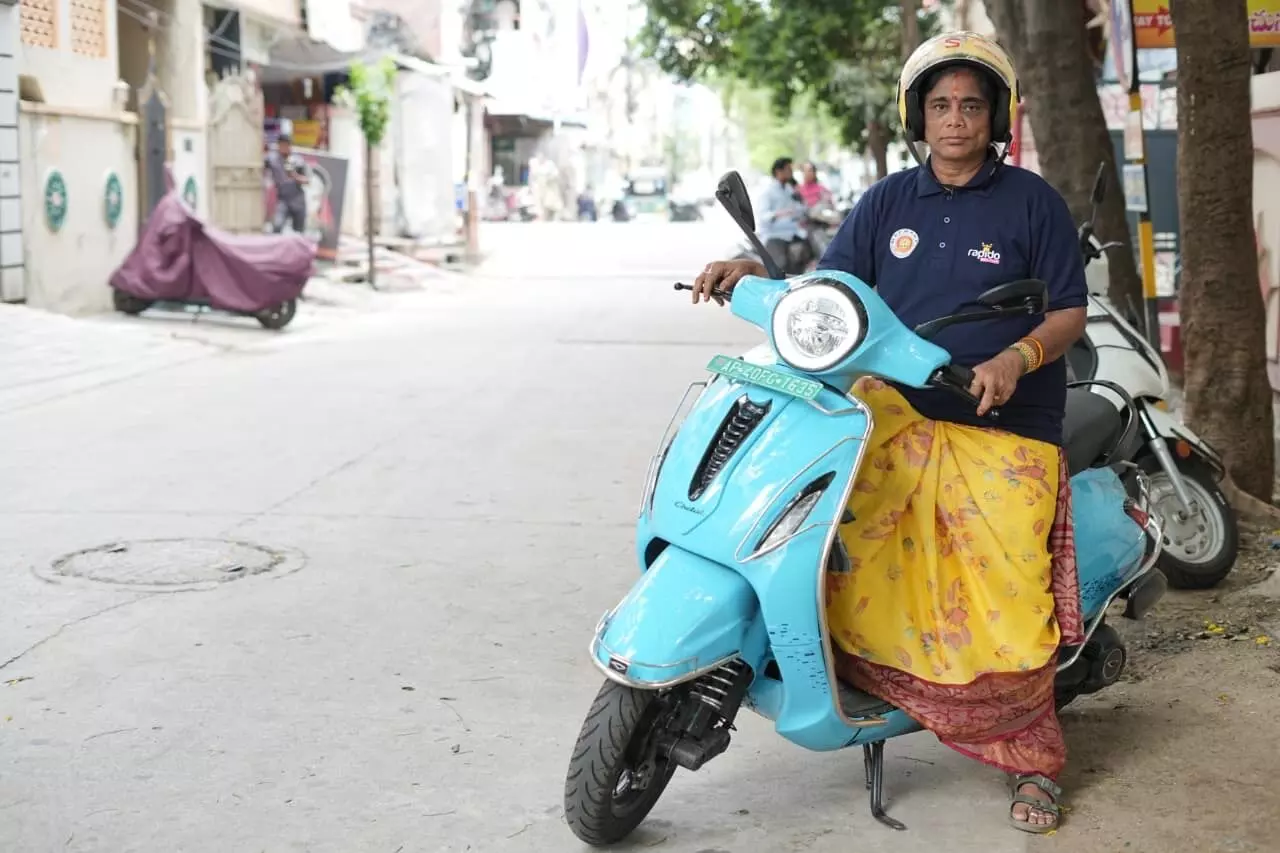E-scooters to e-autos: How Andhra women SHGs are stepping into gig economy for brighter tomorrow
Manju is not alone. Across Andhra Pradesh, women like her are part of a quiet revolution
By Newsmeter Network
E-scooters to e-autos: How Andhra women SHGs are stepping into gig economy for brighter tomorrow
Visakhapatnam: On a quiet afternoon, Vadlapudi Glory Manju finishes her household chores, ties her dupatta tight, and kick-starts her shiny e-scooter in Vijayawada.
Within minutes, she’s weaving through the city’s bustling lanes, ferrying passengers on Rapido rides. What began as a government-backed initiative in March this year has now turned into her source of pride—and freedom.
“I earn about ₹10,000 a month,” she says, eyes sparkling. “More than money, it’s the independence that makes me happy. My children tell me they’re proud of me—that’s my biggest reward.”
Manju is not alone. Across Andhra Pradesh, women like her are part of a quiet revolution—balancing household responsibilities with newfound entrepreneurial journeys. Armed with electric scooters, smartphones, and an unshakable spirit, hundreds of women from Self-Help Groups (SHGs) are stepping into the gig economy, steering their families into brighter tomorrows.
The Journey Begins on Women’s Day
The story began on March 8—International Women’s Day—when Chief Minister N. Chandrababu Naidu launched a special initiative under the “One Family, One Entrepreneur” vision. The Mission for Elimination of Poverty in Municipal Areas (MEPMA) partnered with Rapido to provide electric two-wheelers and three-wheelers to SHG women and their families.
In the pilot phase, loans were facilitated for 1,000 beneficiaries across nine towns, including 400 each in Visakhapatnam and Vijayawada, 50 in Nellore and Guntur, and smaller clusters in Kurnool, Tirupati, Kakinada, and Rajahmundry. Of these, 760 were electric two-wheelers and 240 were e-autos.
While the loans are issued in the women’s names, family members with valid licenses are permitted to drive in cases where the woman herself doesn’t have one. To make things easier, MEPMA prepared project reports and assisted with bank linkages under the Self-Employment Programme (SEP) scheme.
Rapido pitched in with extra support—waiving onboarding fees for the first few months and offering EMI assistance of ₹1,000 a month for a year. This cushion ensured that women could begin earning without being weighed down by repayments from day one.
So far, 1,003 families have benefited, and 688 women have registered directly on Rapido.
From Struggles to Strength
For many, the scheme has been nothing short of life-changing.
Take Madhavi from Kandrika, Vijayawada. When her husband Brahmananda Reddy suffered paralysis, her world seemed to crumble. “I am an SC woman. I married out of love in an inter-caste marriage. After marriage, my husband became bedridden,” she recalls. While he now receives a disability pension of ₹6,000 under the current coalition government, it wasn’t enough to keep the household afloat.
Through her DWCRA group, Madhavi learnt about the MEPMA-Rapido programme. With a ₹16,000 subsidy, she bought an Activa scooter and joined Rapido. “I earn around ₹12,000 per month. After paying my EMI of ₹4,500, the rest supports my children’s education,” she says with quiet determination.
In another corner of Vijayawada, 45-year-old Badisa Bhavani faced a similar challenge. With her husband bedridden, she took on the mantle of breadwinner. An e-scooter worth ₹1.2 lakh, bought with a down payment and bank loan, became her ticket to dignity. Today, she makes ₹500–700 a day. “I’ll continue this journey with pride,” she says.
Beyond the Wheel: Women's Empowerment at Core
Behind these individual stories lies a carefully crafted policy. Subsidies range from ₹12,300 for scooters to ₹36,000 for autos, bank loans cover the rest, and Rapido ensures the first year feels less daunting with waived charges and EMI support. With lower fuel and maintenance costs of electric vehicles, women entrepreneurs are managing to save between ₹13,000 and ₹16,000 monthly.
Already, more than 45,000 rides have been completed in just three months (May–July), with women drivers collectively earning ₹35 lakh. Encouraged by this success, the state government plans to scale up the initiative to 4,800 women next year.
Calling it a proud milestone, HRD & IT Minister Nara Lokesh remarked, “Women empowerment has always been a key focus of the TDP government. With this partnership with Rapido, over 1,000 women have been empowered. This is just the beginning—we will be doing much more.”